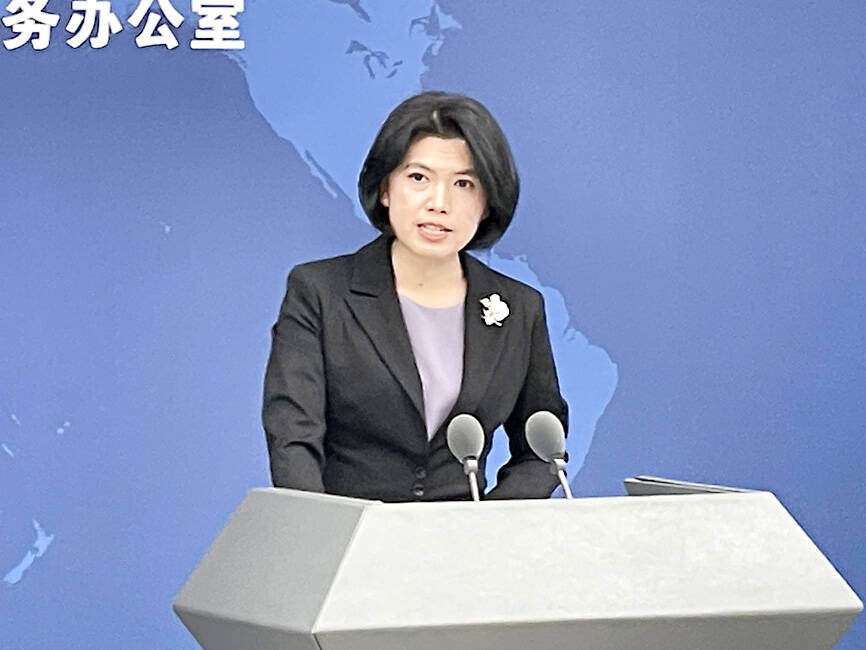Taiwanese writer Liao Meng-yen (廖孟彥) has been arrested in China for producing obscene content, China’s Taiwan Affairs Office (TAO) said yesterday, but did not comment on what sentence had been handed down.
The Taipei-based Straits Exchange Foundation (SEF) on Tuesday said that the writer, known as Roson (羅森), had not contacted his family for more than a year.
The family last week asked for assistance from the foundation, which promised to contact the Beijing-based Association for Relations Across the Taiwan Straits regarding the case, the SEF said.

Photo: CNA
The SEF did not release further details in accordance with his family’s wishes.
On Dec. 1, a post on Professional Technology Temple (PTT) said that Liao had been sentenced to 12 years in prison, citing a message from a Chinese reader on Nov. 30.
On Feb. 7, Xinhua news agency reported that Chinese police had arrested a man surnamed Liao for “propagating obscene messages in the guise of fantasy novels.”
At a regular news conference in Beijing yesterday, TAO spokeswoman Zhu Fenglian (朱鳳蓮) confirmed that “relevant departments” were handing the case in response to a question from Taiwanese reporters.
Liao is suspected of “producing, selling or disseminating obscene articles for profit” and the case is being handled according to the law, Zhu said in China’s first public comments on the matter.
Liao, who has lived in China’s Guangdong Province for many years, is known for writing erotica and wuxia (武俠, martial arts) fantasy stories.
The writer’s China-based Web site has been inaccessible since September last year and the most recent post on his Sina Weibo account was in November last year.
In China, standards governing speech and publishing are fluid, Cross-Strait Policy Association researcher Wu Se-chih (吳瑟致) said yesterday, warning that areas with more ambiguity are subject to legal intervention.
The word of Chinese authorities is law, making it difficult to identify where the boundaries are, Wu said.
Chinese authorities have in the past few years been cracking down on the arts and entertainmentsector, especially online and digital media, he added.
China has over the past few years opened to more Taiwanese writers and publishers, while at the same time failing to define standards, he said.
Taiwanese writers also have a vastly different understanding of freedom of speech and publishing than the Chinese government, he said.
Content deemed to be political, harmful to the image of the country or its leaders, or detrimental to “Chinese rejuvenation” is subject to censorship, Wu said, adding that creative industries should not move to China.
Additional reporting by Chen Yu-fu

A relatively large earthquake may strike within the next two weeks, following a magnitude 5.2 temblor that shook Taitung County this morning, the Central Weather Administration (CWA) said. An earthquake struck at 8:18am today 10.2km west of Taitung County Hall in Taitung City at a relatively shallow depth of 6.5km, CWA data showed. The largest intensity of 4 was felt in Taitung and Pingtung counties, which received an alert notice, while areas north of Taichung did not feel any shaking, the CWA said. The earthquake was the result of the collision between the Philippine Plate and the Eurasian Plate, the agency said, adding

Snow fell in the mountainous areas of northern, central and eastern Taiwan in the early hours of yesterday, as cold air currents moved south. In the northern municipality of Taoyuan, snow started falling at about 6am in Fusing District (復興), district head Su Tso-hsi (蘇佐璽) said. By 10am, Lalashan National Forest Recreation Area, as well as Hualing (華陵), Sanguang (三光) and Gaoyi (高義) boroughs had seen snowfall, Su said. In central Taiwan, Shei-Pa National Park in Miaoli County and Hehuanshan National Forest Recreation Area in Nantou County saw snowfall of 5cm and 6cm respectively, by 10am, staff at the parks said. It began snowing

HOLIDAY EXERCISE: National forest recreation areas from north to south offer travelers a wide choice of sights to connect with nature and enjoy its benefits Hiking is a good way to improve one’s health, the Forestry and Nature Conservation Agency said, as it released a list of national forest recreation areas that travelers can visit during the Lunar New Year holiday. Taking a green shower of phytoncides in the woods could boost one’s immunity system and metabolism, agency Director-General Lin Hwa-ching (林華慶) cited a Japanese study as saying. For people visiting northern Taiwan, Lin recommended the Dongyanshan National Forest Recreation Area in Taoyuan’s Fusing District (復興). Once an important plantation in the north, Dongyanshan (東眼山) has a number of historic monuments, he said. The area is broadly covered by

COMMUNITY SPIRIT: As authorities were busy with post-typhoon cleanups elsewhere, residents cleaned fallen leaves and cut small fallen trees blocking the hiking trails All hiking trails damaged by Typhoon Kong-rey have been repaired and has reopened for people who want a refreshing hike in Taipei during the Lunar New Year holiday, a city official said. The Taipei Basin is known for its easily accessible hiking trails. It has more than 130 trails combined into the 92km-long Taipei Grand Trail, which was divided into seven major routes when it was launched by the Taipei City Government in 2018. Last year, a part of the sixth route of the Grand Trail collapsed due to Typhoon Kong-rey, which hit Taiwan in October. The damaged section belongs to one